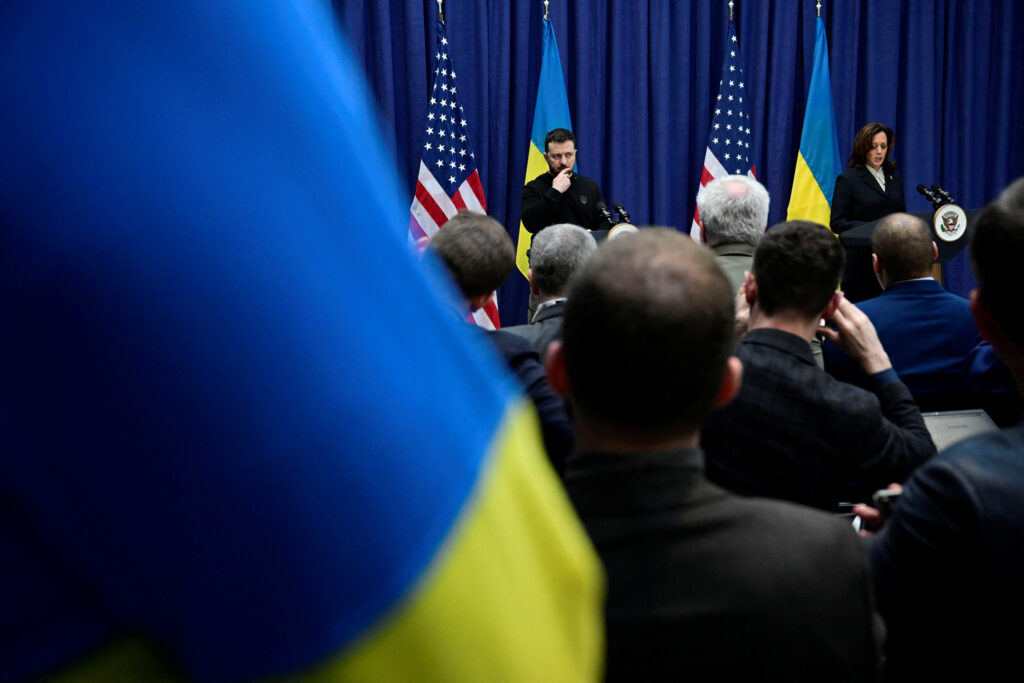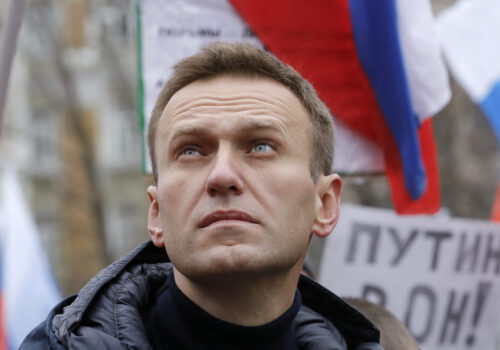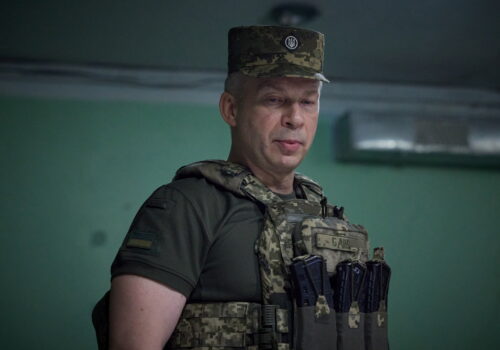MUNICH—The stench of appeasement hung over the Munich Security Conference this past weekend, leaving more than a few European leaders making comparisons to September 1938. That was when a very different Munich meeting placated a murderous dictator—with disastrous consequences.
It was then that British Prime Minister Neville Chamberlain, meeting with Nazi leader Adolf Hitler and their French Republican and Italian fascist counterparts, signed off on the Third Reich’s annexation of the Western part of Czechoslovakia (which the Germans called Sudetenland), naively hoping that would allow them to avoid a larger European war.
With the two-year mark of Russian dictator Vladimir Putin’s full-scale invasion of Ukraine coming up this week—and with his ongoing war and occupation of sovereign Ukrainian territory—it’s worth reflecting on the dynamics behind the 1938 Munich Agreement and Chamberlain’s subsequent “Peace for Our Time” speech, as they may hold lessons for US lawmakers in the House of Representatives who continue to balk at approving urgently needed support for Ukraine after four months of dithering in Congress.
Hitler had threatened to unleash a European war unless the leaders of Britain, France, and Italy agreed to German annexation of the Sudetenland, a border region with an ethnic German majority. “My good friends,” Chamberlain said in a statement in front of 10 Downing Street, “for the second time in our history, a British prime minister has returned from Germany bringing peace with honor. I believe it is a peace for our time . . . Go home and get a nice quiet sleep.”
Echoes of history
There are plenty of differences between then and now, but one shouldn’t overlook the striking similarities.
First, Hitler had annexed German-speaking Austria in March 1938, and he was determined to swallow up the German-speaking Sudeten region of Czechoslovakia next. Today, Putin has already occupied and annexed portions of Ukraine with sizable numbers of Russian speakers—areas that he considers to be his property: Crimea, Luhansk, Zaporizhzhia, Kherson, and Donetsk.
Hitler wrote at length about his warped historic, genetic, and anti-Semitic notions in Mein Kampf, providing a copy of his national best-seller to every young marrying couple in Third Reich Germany. By comparison, Putin most recently shared his own twisted justifications for denying Ukrainian statehood, dating back to the ninth century, with American media personality Tucker Carlson—not such a bizarre vehicle if one considers Carlson’s influence on a Republican minority in the House that is currently standing in the way of approving additional aid for Ukraine.
And just as in 1938, when the focus of debate was on the future of Czechoslovakia and when commentaries praised the country’s bravery and resilience, so too now is the focus on Ukraine. Back then, the more appropriate focus should have been on the dictator responsible for the threat and on how to stop him. Today, the more appropriate focus is no different.
One more similarity between 1938 and today is the gradual alignment of authoritarian powers. Shortly after Chamberlain’s infamous Munich Agreement, a fascist-nationalist German-Italian-Japanese axis of nations emerged. Today, European and US leaders alike have observed an increasingly close alignment among Russian, Chinese, Iranian, and North Korean authoritarian leaders.
A morose Munich
The Munich Security Conference this week, which marked the convening’s sixtieth anniversary, is as good a measure of the transatlantic zeitgeist as any.
Yet four news events that unfolded outside of Munich soured the mood: Former US President Donald Trump’s campaign trail statement that he would let Russians “do whatever the hell they want” to NATO allies not paying enough for defense; the death in prison of Russian opposition leader Alexei Navalny; the biggest Russian battlefield victory in months in the Ukrainian city of Avdiivka; and leaked reports of Moscow’s plans to develop a nuclear space weapon, which the Atlantic Council’s John Cookson suggested could be a “Sputnuke” moment.
On Trump’s statement, a range of Republican supporters of Trump in Munich were at pains to explain why their presidential candidate should be taken seriously but not literally, as US military support for Ukraine, Poland, and NATO increased during his administration. Their argument that Trump simply wants Europeans to carry more of their own defense still left allies worried that they are in for a long period of US unpredictability.
Regarding Navalny, his wife Yulia (who was in Munich to speak on his behalf) provided a courageous first response to reports of his death, accusing Putin of killing him and vowing that the Russian dictator would pay for it. Some long-time Munich conference participants, who heard Putin’s initial declaration of war on the West there in 2007, speculated that he might well have timed Navalny’s death with the Munich gathering to send an unmistakable message of the West’s powerlessness to stop such outrages.
“It sounds like Putin might have done it for our benefit,” said Polish Foreign Minister Radek Sikorski. “I’m not prone to conspiracy theory, but I understand conspiracy practice.”
It is impossible not to link Russian advances in Ukraine with the long delay in US congressional support for new weapons deliveries, as the outgunned and outmanned Ukrainians struggle to hold the line against Russian forces commanded by Putin, who is willing to suffer outsized casualties. Ukrainian President Volodymyr Zelenskyy said that in the battle for Avdiivka, Russia’s losses were seven times those of Ukraine.
If “Ukraine is left alone, Russia will destroy us,” Zelenskyy told the Munich conference. “If we don’t act now, Putin will succeed in turning the next few years into a catastrophe—not only for Ukraine but for others as well.”
On “Sputnuke,” the consensus in Munich was a resigned European shrug as Russia marches on, develops asymmetric advanced weaponry that could take down European communications in space, and shifts to a war footing that Europe’s democracies will never match.
Writing for the Washington Post, David Ignatius pointed out Russia’s motivation for developing such weaponry: “Ironically, it’s the Ukraine conflict—and the role of space systems in helping Kyiv survive the initial Russian onslaught in 2022—that likely triggered Russia to rush development of its new space tactics.”
Four causes for concern
The concerns and fears at Munich this year, which far overwhelmed rare voices of optimism, broke down into four mutually reinforcing categories.
The first fear was about Russia’s resilience and Putin’s increasing confidence, which contributed to a growing conviction that Russia will remain a problem for the West for some years to come.
The second concern stemmed from the possibility that Ukraine might lose the war, with a growing danger that it could be overwhelmed by Russian military mass, and from an assessment of the repercussions of that scenario most immediately for other former Soviet bloc states, from Poland to the Baltics, but also globally, from the United States to the Middle East and Asia.
The third concern, one that pervaded almost every conversation at the conference this weekend, was about the potential for a reduced US commitment not only to Ukraine but also to the nearly eighty-year-old transatlantic bond, particularly should Trump be elected in November.
The fourth fear, closely connected to the third, was that Europe still lacks the military industrial capacity and the political will to defend itself, let alone defend Ukraine. Though Europe is ramping up its defense industrial production and increasing its spending, it would take years for European countries to replace US capacity, if they ever could.
The past three Munich Security Conferences have all focused on Ukraine, and each year the conventional wisdom has missed the mark. One can only hope that is true again.
In 2022, there were growing concerns that Putin would invade Ukraine, which did happen, but there was also a consensus that Ukraine would be overrun within days by such a military offensive. In 2023, the mood was more positive, with many voices believing that Ukraine’s remarkable performance in the previous year could lead to a stunning counteroffensive that would help Kyiv regain territory occupied by Russia.
The collective view is that 2024 will be a moment of truth in Ukraine. Without US congressional approval for additional support soon, the thinking goes, the odds are that Russia will continue to make gains and that some could be dramatic by the time of the seventy-fifth NATO Summit in July in Washington, DC—just ahead of US elections.
It is worth remembering the calls of “shame” from the House of Commons galleries, as Chamberlain defended his Munich arrangements in 1938. “I have nothing to be ashamed of,” he answered back. “Let those who have hang their heads.”
Not too late—yet
It’s worth reading what Chamberlain said after returning from Munich as a warning to all who are tempted to sell Ukraine short, underestimate Putin and other emerging despots, and retreat into the most dangerous of all responses: naive complacency.
“The path which leads to appeasement is long and bristles with obstacles,” said Chamberlain. “The question of Czechoslovakia is the latest and perhaps the most dangerous. Now that we have got past it, I feel it may be possible to make further progress along the road to sanity.”
There is an oft-repeated quote that says “insanity is doing the same thing over and over again and expecting different results.”
It’s not too late for the US House of Representatives to change course, to bring a vote on a Senate bill providing Ukraine aid to the floor, and to provide Ukraine the support it urgently needs to do the free world’s bidding against Putin. Should this fail, Europe would need to greatly accelerate its ramp-up of defense production and its support for Ukraine.
The lesson of Munich, then and now, is that the cost of countering a despot will only grow the longer democracies wait to do so. As Sikorski said in Munich, “I have more doubts about us than the Ukrainians.” If the United States fails to step up to the moment this year, he said, “it could affect the national-security calculations of every country on Earth. We are at a dramatic moment, one of terrible foreboding.”
Frederick Kempe is president and chief executive officer of the Atlantic Council. You can follow him on Twitter @FredKempe.
THE WEEK’S TOP READS
Anne Applebaum | THE ATLANTIC
In this powerful reflection on Alexei Navalny’s life, Anne Applebaum argues that the specific details of his death “don’t matter,” whether he was murdered or died from months of ill health, because “the Russian state killed him,” she writes. “Putin killed him—because of his political success, because of his ability to reach people with the truth, and because of his talent for breaking through the fog of propaganda that now blinds his countrymen, and some of ours as well.”
Despite Navalny’s death, Applebaum remains optimistic. “Even behind bars Navalny was a real threat to Putin because he was living proof that courage is possible, that truth exists, that Russia could be a different kind of country,” she writes. “For a dictator who survives thanks to lies and violence, that kind of challenge was intolerable. Now Putin will be forced to fight against Navalny’s memory, and that is a battle he will never win.” Read more →
#2 Opinion: Is This a Sputnik Moment?
Kari A. Bingen and Heather W. Williams | NEW YORK TIMES
In this compelling analysis, Kari Bingen and Heather Williams evaluate the parallels between Thursday’s announcement of a new Russian antisatellite capability, suspected of being a space-based nuclear weapon, and the 1957 launch of Soviet satellite Sputnik.
“If it is what the White House suggests, we may now find ourselves facing this generation’s Sputnik moment,” they write. “In 1957, when the former Soviet Union launched the world’s first satellite and shocked Americans, the Eisenhower administration had known about the Soviets’ satellite capabilities for almost two years. Now that we know what Russia is planning, the United States cannot afford to be slow to act.” Read more →
#3 ‘The war has become the background of life’—Andrey Kurkov on Ukraine two years on
Andrey Kurkov | FINANCIAL TIMES
Writing in the Financial Times, Ukrainian novelist Andrey Kurkov presents a striking portrait of Ukrainian life as Russia’s war continues.
“Ukrainians may be responding to journalists less optimistically than they did a year ago, but there is no pessimism either,” Kurkov writes. “The time has come for realism—an understanding that this war will last for a long time, that we must learn to live with it. The effort to keep on ‘keeping on’ that has been a form of resistance for civilians since the all-out invasion now requires a little more energy. For those Ukrainians who are not at the front, the war has become the background of life, and the daily air raid alerts are noted alongside the weather forecast.”
Kurkov’s piece also serves as a warning that if Western support does not come through, life in Ukraine may stop altogether. Read more →
Jonathan Corrado and Markus Garlauskas | FOREIGN AFFAIRS
Read every word of this smart analysis by the Korea Society’s Jonathan Corrado and the Atlantic Council’s Markus Garlauskas on why North Korea continues to be a massive threat to the United States and global security, especially in moments of global upheaval.
“As wars rage in the Middle East, Europe, and Africa, Pyongyang has seized its opportunity to spread death and destruction through arms sales,” Corrado and Garlauskas write. “Although the Kim regime has been systematically isolated from the international community, regularly denies that it is supplying weapons overseas, and is prohibited by UN Security Council resolutions from buying or selling various arms, it has nonetheless become a de facto arsenal for the United States’ adversaries.”
To stop this trade, they argue, “the United States must mobilize a coalition to increase international awareness of the scale of the problem, and strengthen detection, oversight, and sanctions compliance. If these steps are not taken, then North Korea will be able to finance further weapons testing and development, gain access to dangerous new technologies, launder its ill-gotten profits, and spread mayhem and destruction.” Read more →
#5 Remarks by President Biden on the Reported Death of Aleksey Navalny
Joe Biden | THE WHITE HOUSE
Speaking shortly after reports of Alexei Navalny’s death, US President Joe Biden linked the brutality Navalny faced to Russia’s continued assault on Ukraine and the United States’ continuing failure to provide urgently needed military and financial support.
“What has happened to Navalny is yet more proof of Putin’s brutality,” Biden said. “No one should be fooled—not in Russia, not at home, not anywhere in the world. Putin does not only target [the] citizens of other countries, as we’ve seen what’s going on in Ukraine right now, he also inflicts terrible crimes on his own people.”
Biden addressed US responsibility to continue Navalny’s fight: “This tragedy reminds us of the stakes of this moment. We have to provide the funding so Ukraine can keep defending itself against Putin’s vicious onslaughts and war crimes.” Read more →
Atlantic Council top reads
Further reading
Fri, Feb 16, 2024
Navalny’s life and death show Putinism isn’t inevitable
New Atlanticist By Doug Klain
The Russian opposition leader built a national movement based on exposing the rampant corruption and gangsterism of Putin’s system.
Fri, Feb 16, 2024
Youth unemployment in China: New metric, same mess
Econographics By Nicole Goldin
The youth labor induced weakening of Chinese productivity and growth has the potential to impact youth labor markets worldwide.
Fri, Feb 16, 2024
Can Ukraine’s new army chief overcome mounting battlefield challenges?
New Atlanticist By Peter Dickinson
As Ukraine’s new top general, Oleksandr Syrsky must now come to grips with a range of mounting difficulties facing the Ukrainian military.
Image: Ukrainian President Volodymyr Zelenskiy and U.S. Vice President Kamala Harris attend a press conference during the Munich Security Conference (MSC) in Munich, southern Germany on February 17, 2024. Tobias SCHWARZ/Pool via REUTERS



